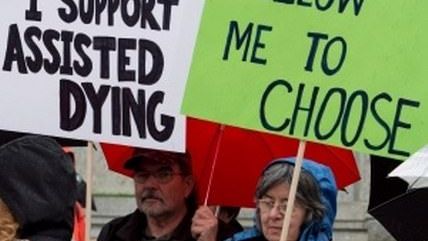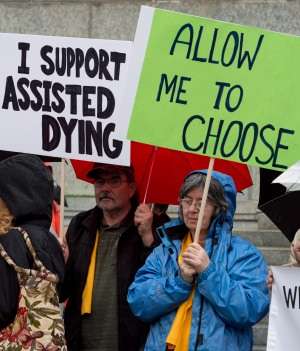Canada's Top Court Rules in Favor of Assisted Suicide
For consenting adults suffering from severe and incurable medical conditions


It's another notch in the freedom belt for Canada. Today the country's supreme court overturned, in a unanimous decision, a 20-year-old ban on physician-assisted suicide for adults. From Reuters:
The top court said it would be allowed in the case of consenting adults who are suffering intolerably from a severe and incurable medical condition, whether physical or psychological, and the illness does not have to be terminal. The decision takes effect in 12 months.
"We do not agree that the existential formulation of the right to life requires an absolute prohibition on assistance in dying, or that individuals cannot 'waive' their right to life," the court said.
Canada's parliament could possibly overturn the decision, but Reuter's predicts it as unlikely (UPDATE: A reader tells me that actually the parliament can't just overturn a supreme court decision, and the statement that it could has been deleted from the Reuter's piece I've quoted). Parliament will still have to set up the regulatory framework for how physician-assisted suicide will work. In that way, the decision is not unlike when the Canada's top court struck down the country's existing prostitution laws and ordered the country to come up with a new framework. Unfortunately, what Canada ended up implementing didn't appear to be an improvement from the previous laws, which essentially technically allowed legal prostitution but forbid advertising or allowing sex workers to organize brothels.
So while the ruling does look like a huge win for the right of adults to make important medical decisions about their own lives and how much they're willing to suffer, Canadians should keep an eye on what their parliament actually does about it.
Below, Reason TV on assisted suicide in Montana, which is almost Canada:
Editor's Note: As of February 29, 2024, commenting privileges on reason.com posts are limited to Reason Plus subscribers. Past commenters are grandfathered in for a temporary period. Subscribe here to preserve your ability to comment. Your Reason Plus subscription also gives you an ad-free version of reason.com, along with full access to the digital edition and archives of Reason magazine. We request that comments be civil and on-topic. We do not moderate or assume any responsibility for comments, which are owned by the readers who post them. Comments do not represent the views of reason.com or Reason Foundation. We reserve the right to delete any comment and ban commenters for any reason at any time. Comments may only be edited within 5 minutes of posting. Report abuses.
Please to post comments


So... more Canadians to commit suicide?
Are you trying to tell me something?
it WOULD be the polite thing to do...
After you. I insist.
Good call eh.
why place limits on the health of the one who decides to die?
Baby steps, dude.
i'm just curious as to the logic behind it... oh, nevermind.
We can't throw the baby out with the bathwater.
well, we can, but only if the baby is terminally ill?
Depends on how much it'll cost the government to care for it.
The logic is the same as it always is. They want to maintain control over peoples' lives. Giving you a little slack makes you forget that the leash is even there.
It's okay. Politicians and doctors have assured us it's only for 'terminally ill cases'. As they said in Belgium and Holland back in the day. We now learned 'terminally ill' can be stretched and interpreted very loosely.
Not sure why the government needs to get involved.
Back in the 90s, I was skeptical of creating a legal framework for terminally ill people to choose to die because I feared "interested" family members pushing a terminal 'loved one' into the decision.
I've abandoned that fear but I still wonder if it happens.
I'd bet it does in cases where the family has a substantial financial burden.
i don't know about that. i think the private thoughts and conversations would definitely contain the "I wish he/she would just die already" type of discussion, but I would doubt it would go (very much) in the direction of the "just think of how you'll be at peace. no more pain. c'mon, you know your life sucks and it's costing us a fortune."
Maybe, but even then, I don't really care.
This.
I'm sure it does.
My father slipped into a coma for three months due to complications following aortic surgery.
Two months into the coma the hospital wanted to end his life. We had to fight tooth and nail with ICU. I couldn't believe it. They told us we had to consider his 'quality of life' if he kept him alive - the implication being we were being unreasonable and selfish.
I went into intellectual and tactical overdrive with them to the point the doctor wondered what I did for a living I literally obliterated any reasons they had for doing so.
Long story short, I learned a lot about hospital procedures, politics and culture during that time.
My father? He's not 100% healthy to be sure, but he's still around 10 years after the fact.
At the time I remember seeing a few elderly people in ICU and wondered if anyone would fight for them. Given how the doctors behaved in our case, they would have needed one.
Sad.
That is healthcare in Canada as I see it, I'm glad to hear your father is still around.
He is too. Gets teased a lot (we're a ball busting type of family) but he's happy.
Similar but opposite. We were trying to get them to turn off the fucking machines and they wouldn't. Neither of us should have had to deal with that loss of control.
I agree.
after my dad's stroke we had meetings with the doctors. we were all ready to pull the plug- seeing as he was brain dead. They seemed a little confused as to the fact that all of us- the 4 kids and his wife- were so quickly on the same page. She was/is catholic, but it wasn't even really a thought.
They kept asking if we needed to take time to think about it and investigate other options so i asked them straight out, "he's dead, right? Has anyone from this state ever come back? No, right? can you dope him up in case there are still any pain receptors? Beyond that, it's up to his wife."
My father has had many strokes and it's likely that's what's gonna get him.
Not that he smoked a pack or two of cigarettes until his medical ordeal - which incidentally cured his addiction to smoking.
He asked for an espresso when he came around but not a cigarette.
i think my dad's was pork sausage.
Seriously, he was a tobacco user in his youth, but he really just didn't take care of himself.
There are documented cases of that happening, but there were cases even before the issue arose. ("Gee, dad, take a bunch more of those barbituates to ease the pain.")
TBS, I do want the option to choose my time to go out without having to worry that people could go to jail for helping me.
Isn't everyone terminally ill?
Terminally stupid in my case.
In the last two days I've had some nasty text messages from my wife and sister over something, something I may or may have not done.
Meh.
current wife?
Never been divorced so...yes?
if my wife sent me a nasty text message i don't know how i would react. I don't have an ex wife, but I'm pretty sure I know how'd i'd react if i did.
Laugh it off; especially if it's deserved. No sense arguing.
Mind you, it sometimes only angers them more as they interpret it as being aloof or dismissive.
Which it sometimes is.
But my gal is as good as they come so when she does get angry it's usually with cause.
well, i've never done anything wrong, so I wouldn't understand that.
Human life is the only sexually transmitted infection with a 100% mortality rate.
The government was already involved.
Yeah...voluntary.
It's not as if Canada's famous "single-payer" health system, desperate for savings, will try to pressure patients into "voluntarily" exercising their "right to die."
I never heard a lot of trust on H&R for the single-payer system, so I presume no-one's going to say anything like "OMG, we can totally trust the Canadian health care system!"
i've never heard a lot of trust on H&R for ANYTHING. that's why it's awesome.
I don't have any trust in the system as it currently stands so adding this to the docket only increases my skepticism to cynicism.
Silly me, I thought self-ownership and the attending right to die and/or kill yourself existed completely independently of any given medical system.
Yay, Canucistan!
Turn $12 BECOMES $4000 PER WEEK! 100% Profitable!!
Get immediate access to our entire course
right now to discover an easy system
that will give you the potential
to make... $300 A Day and even more! ..
Open this link to get the opportunity , as like i did and i am feeling crazy.. it realy works,
????? http://www.netcash50.com
I don't blame article writer, but Reuters, for getting it wrong. Parliament can't overturn a court decision legislatively. What they can do is pass a law notwithstanding certain Constitutional protections, it has to specifically say it's doing so, for a limited period of time of 5 years that can be renewed, so they could for instance reenact the provisions the court partially struck down but only by specifically citing this. Politically it's not something elected officials usually want to do (Quebec has done so in the past) especially since polls favour suicide, but it can be.
To link to an "authoritative" source, the Canadian Parliament's website:
http://www.parl.gc.ca/Content/.....p194-e.htm
"...Section 33(1) of the Charter of Rights permits Parliament or a provincial legislature to adopt legislation to override section 2 of the Charter (containing such fundamental rights as freedom of expression, freedom of conscience, freedom of association and freedom of assembly) and sections 7-15 of the Charter (containing the right to life, liberty and security of the person, freedom from unreasonable search and seizure, freedom from arbitrary arrest or detention, a number of other legal rights, and the right to equality). Such a use of the notwithstanding power must be contained in an Act, and not subordinate legislation (regulations), and must be express rather than implied...."